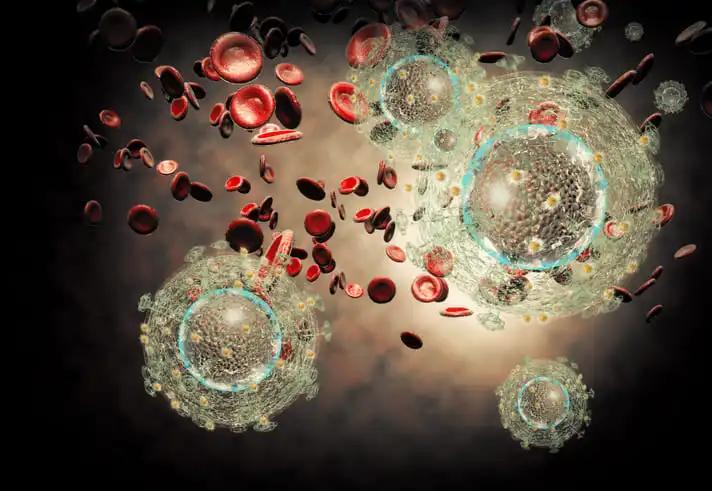KEY TAKEAWAYS
- Phase I/IIa trial aimed to assess the safety of Inobrodib alone and in combination with POM and DEX in RRMM patients.
- The preliminary outcomes show that Inobrodib is well tolerated and exhibits promising efficacy in heavily pretreated RRMM patients.
- Safety analysis revealed that thrombocytopenia and anemia were the most common treatment-emergent adverse events.
- Inobrodib, the first potent p300, and CBP bromodomains inhibitor, shows promising antitumor activity in RRMM patients.
Inobrodib (CCS1477) is the first potent, selective, orally bioavailable inhibitor of the bromodomains of p300 and CBP, two closely related histone acetyltransferases with oncogenic functions in hematological malignancies. Inobrodib demonstrates total antitumor cell activity in various hematological cell lines, including multiple myeloma, and additive/synergistic activity with pomalidomide. In this Phase I/IIa trial (NCT04068597), researchers report preliminary safety (primary objective), efficacy (secondary purpose), and pharmacokinetic (PK) data for inotropic alone and in combination with pomalidomide (POM) and dexamethasone (DEX) in patients with relapsed/refractory multiple myeloma (RRMM). Patients who consented and were eligible had confirmed RRMM and had exhausted all available standard-of-care treatment options (81% of patients were exposed to all three classes). During the dose escalation phase of monotherapy, patients received inobrodib in 28-day cycles at doses ranging from 25 to 50 mg OD or BD on a continuous or intermittent basis.
During combination dose expansion, patients received POM and DEX according to the approved dosing regimen and intermittent dosing of inobrodib. According to IMWG, investigators evaluated responses. About 32 RRMM patients with a median age of 67 (50-90) years received inobrodib monotherapy. The median number of prior therapies was seven (4-9). The median duration of follow-up was 42 days (range: 2–308), and the median number of cycles received was 1.5 (range: 0.25–10).18 of 24 (75%) dose-escalation phase patients reported Grade (Gr) 3/4 treatment-emergent adverse events (TEAEs); 8 of 24 (33%) patients experienced TEAEs considered related to inobrodib; thrombocytopenia and anemia were the most common. The most common TEAEs were thrombocytopenia (all grades 58.3%; [gr 3/437.5%] of patients) and fatigue (all stages 58.3%; [gr 3 4.2%] of patients). When treatment was discontinued, thrombocytopenia was reversible without losing efficacy in responders. All types of bleeding were low severity (16.7%, including conjunctival hemorrhage, rectal bleeding, hematuria, and epistaxis; [gr 3/4 0%]). Neutropenia was uncommon (12.5%, all present at baseline; [gr 3 8.2%]), and infection rate and pattern were as expected in the heavily pre-treated population studied (66.7%; [gr 3 37.5%, a solitary gr 5 event]).
Progressive disease was the leading cause of discontinuation among all patients (18 patients, 72%), with only two patients (8%) discontinuing owing to related events. Following monotherapy dose escalation, the recommended phase 2 dose/schedule (RP2D) was determined to be 35mg BD, 4 days on/3 days off.
Initial data suggest that the safety profile of inobrodib/POM/DEX is comparable to that of monotherapy, with no new safety signals. As dose escalation continues, preliminary efficacy data are gathered. Inobrodib is well tolerated and exhibits promising efficacy in patients with RRMM who have been extensively pretreated. These findings support the development of inobrodib in combination with standard therapies for patients with RRMM.
Clinical Trial: https://clinicaltrials.gov/ct2/show/NCT04068597
Emma Searle, Jim Cavet, Steven Knapper, Ceri Bygrave, Victoria Campbell, Dima El-Sharkawi, Charlotte Pawlyn, Maria Creignou, Harriet S. Walter, David Valcarcel, Marta Hidalgo, Tomasz Knurowski, Karen Clegg, Neil Pegg, Will West, Debbie Haynes, Kris Frese, Tim C. P. Somerville/AN OPEN-LABEL PHASE I/IIA STUDY TO EVALUATE THE SAFETY AND EFFICACY OF CCS1477 AS MONOTHERAPY AND IN COMBINATION WITH POMALIDOMIDE/DEXAMETHASONE IN RELAPSED/REFRACTORY MULTIPLE MYELOMA/Inc, M. G. (n.d.). AN OPEN-LABEL PHASE I/IIA STUDY TO EVALUATE THE SAFETY AND EFFICACY… by Emma Searle. Library.ehaweb.org. Retrieved July 15, 2023, from https://library.ehaweb.org/eha/2023/eha2023-congress/386692/emma.searle.an.open-label.phase.i.iia.study.to.evaluate.the.safety.and.html?f=menu%3D16%2Abrowseby%3D8%2Asortby%3D2%2Ace_id%3D2489%2Aot_id%3D27922%2Atrend%3D4016%2Amarker%3D4178.



